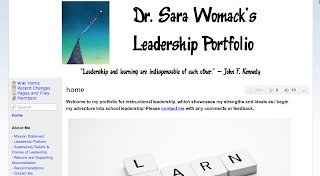In my experience, most school leaders are not the technology leaders of the school. More experienced principals and district-level administrators did not grow up with technology and are unfamiliar with hardware and applications that can produce a more effective and efficient educational environment.
Educational leaders must make an effort to become versed in technological innovations that may impact student learning. The International Society for Technology in Education (ISTE) has developed guidelines for how administrators can become technology leaders in their schools. The National Educational Technology Standards for Administrators (NETS-A) outline five areas that will encourage the use of digital technology throughout the school culture.
In addition, I've listed my top ten technology tips for school administrators from the perspective of a tech trendy teacher.
- Utilize technology to increase effectiveness and efficiency of the school as an organization. How can technology decrease the amount of time that teachers are in faculty meeting or professional development that may not apply to an entire faculty? Explore applications, like Google docs and Twitter, that can maximize teacher time. The gift of time is an amazing way to build trust and value teachers.
- Model technology for students, parents, and teachers. Just as principals expect teachers to model skills for their students, school leaders should show the utilization of technology in their job. How can a principal ask students to become digital, global citizens, when they do not rely on technology themselves?
- Learn to speak the language of social media. Students and their families use social media to connect and communicate. School leaders must tap into this resource for information proliferation and stakeholder collaboration.
- Provide hardware and resources. For students to become digital citizens in our global society, they must utilize current technology. Many of my elementary school students have operated computers that are older than they are. School leaders must make it a priority to provide the relevant technology tools for students and teachers.
- Differentiate professional development. Each teacher has different needs for professional development and learns at varying speeds and in different ways. Just as we differentiate for our students, professional development for teachers should be differentiated. Personal learning networks (PLNs) are a great technological tool for learning that allow teachers to determine their interests and needs in the most relevant manner.
- Give teachers time to explore. Author Annie Dillard said, "How we spend our days is, of course, how we live our lives." If teachers aren't given the opportunity to investigate technology, they are not going to utilize technology in the classroom. Give learning goals or let teachers determine their course during this time. Exploration is an incredibly valuable method of professional development.
- Trust teachers as professionals. Teachers should be trusted to do what is best for students. If a teacher believes that the best way to reach his students is through Edmodo, he should be given that freedom. Let teachers utilize the technology that they have discovered through exploration and celebrate mistakes as learning experiences.
- Challenge the faculty. When spending time in classrooms, notice how technology could impact a lesson or student interaction. Push the faculty to utilize technology tools, while offering support when needed. Develop ambitious technology goals with your teachers that will ensure student success in a technological world.
- Ensure digital safety. With the increased use of technology in a school, comes additional possibilities for trouble in the digital playground. Incidence involving predators, cyberbullying, and access to personal information are problems that administrators must address through teacher, student, and parent education.
- Dream of possibilities. What is an area that needs improvement in your school organization? Could you perform teacher observations in a better way? How do you stay current in professional publications? Technology is a tool that can make a school organization, as well as the administration, faculty, students, and stakeholders, more effective and efficient. Whatever you can dream for your school, technology can take you there.

